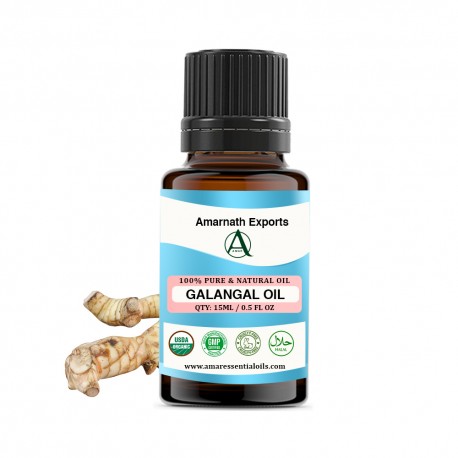No products
Product successfully added to your shopping cart
There are 0 items in your cart. There is 1 item in your cart.
Galangal Oil
New
Galangal, scientifically known as Alpinia galanga, is a perennial herbaceous plant native to Southeast Asia. Often referred to as "Thai ginger" or "Siamese ginger," galangal has been a staple ingredient in Asian cuisines and traditional medicine for centuries.
54 Items
More info
- Botanical Name: Kaempferia galanga
- Other Names: Siamese ginger, colic root, lesser galangal, laos
- Family Name: Zingiberaceae
- Part Used: rhizomes (roots)
- Origin: India
- Odour Strength: Medium to strong
- Extraction Method: Steam Distillation
- Aromatic Tone: Camphorous, herbaceous aroma, adds warmth of spice to a fragrance blend.
- Blends well with: black pepper, cardamom, carnation, cedarwood, chamomile roman, cinammon, clove, coriander, cypress, elemi, fennel seed, frankincense, geranium, ginger, ho leaf, ho wood, juniper berry, lavandin, marjoram, mimosa, myrtle, parsley seed, patchouli, palmarosa, pimento berry
- Main ingredients: carotol, cineole, fenchyl acetate, β-caryophyllene
- Application: Cosmetics, Perfumery, Skin Care, Beauty Care & Medidine.
Buy Galangal Oil | Kaempferia galanga
Galangal, a member of the ginger family native to South-East Asia, grows tall, reaching heights of up to 5 feet. Its distinctive features include vibrant green sword-like leaves, delicate white flowers, and an aromatic rhizome. While in Europe, the root has found its place as a spice, in Thailand, it lends its flavorful essence to enrich curries. Beyond culinary applications, galangal holds significance in indigenous medicine, where it's cherished for its therapeutic properties. Known for its efficacy in treating conditions like rheumatism and inflammation, particularly in cases of bronchial asthma, this ginger-like root is revered for its diverse medicinal uses. From addressing indigestion and colic to tackling dysentery and various skin ailments, galangal emerges as a versatile remedy. In powdered form or as an alcoholic extract, it is believed to possess stimulating properties. Its captivating scent, when combined with ginger, cinnamon, and clove, has even earned it a reputation as an aphrodisiac. Medically, it has been utilized to combat cholera, alleviate congestion, and address digestive issues. Extracting its essence through steam distillation yields Galangal oil, a prized ingredient that harmonizes beautifully with essential oils like chamomile, cinnamon, lavender, and rosemary.
The essential oil of galangal is extracted through steam distillation of the plant's rhizome, resulting in a potent and aromatic oil with a distinct spicy-sweet scent. This meticulous extraction process ensures the preservation of the oil's therapeutic properties and aromatic compounds.
Benefits of Galangal Oil
Digestive Health
Galangal oil is renowned for its digestive benefits. It aids in digestion, relieves bloating and gas, and may alleviate symptoms of irritable bowel syndrome (IBS) and indigestion.
Anti-inflammatory Properties
The anti-inflammatory properties of galangal oil make it effective in reducing inflammation and pain associated with conditions such as arthritis and muscle soreness.
Immune System Boost
Rich in antioxidants, galangal oil helps strengthen the immune system and protect the body against infections and diseases.
Respiratory Health
Galangal oil acts as a decongestant and expectorant, making it useful for relieving respiratory congestion, coughs, and cold symptoms.
Gangal Oil Properities
-
It finds application in a range of respiratory issues including bronchitis, catarrh, asthma, colds, and flu.
-
The oil's volatile compounds function as natural antibiotics, serving as both anti-fungal and antibacterial agents.
-
The oil effectively combats fatigue and restores vitality.
-
It alleviates symptoms of a sore throat, cough, abdominal inflammations, and ulcers.
Reviews
No customer comments for the moment.








